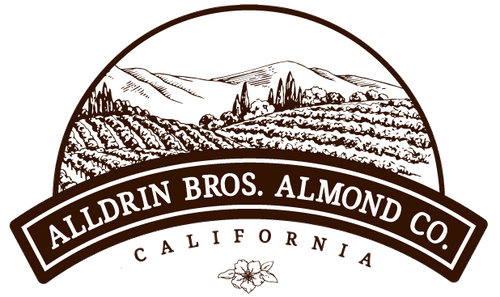ORGANIC-VS-NON-GMO

Farming non-GMO almonds in the Alldrin Bros. almond orchards
With interest increasing in regard to food origins these days, it’s no wonder one of our top questions from our customers is about organic and GMO foods, and how these hot button topics apply to Alldrin Bros. Almonds. And what exactly do these terms mean anyway?
GMO VS. ORGANIC
“Organic” refers to the process and techniques used in growing the product, while the term “GMO” is associated with genetic composition.
People have been modifying species forever using techniques like selective breeding. This is how we got seedless watermelons and almost every breed of dog. It is done by crossing variations of the same species with desirable traits. This is much different than altering species using “Genetically Modified Organisms” or “GMO” products. This is when the genetic code of a plant or animal has been changed using genetic engineering technology. Since 1996, when the first large-scale harvest of a GMO crop occurred in the United States, scientists have added genes from unrelated species to crops in order to make them resistant to disease and pests, have longer shelf lives and be easier to grow. GMOs are widely banned and regulated in other countries and are controversial in the United States for a number of reasons. Among many issues debated regarding GMOs is their potential to contaminate other crops, unknowns about their influence on nutritional values and unintended spreading of genes. Alldrin Bros. has never farmed GMO products in our orchards and never will. All almond trees, in fact, are non-GMO.
In the United States, the USDA monitors and grants organic certifications. Food products that are certified organic are never GMO. As part of the USDA’s in-depth certification process, farmers must prove that from the time the first seed is planted to when it hits your plate, no GMO products were used or exposed to their crops. To be certified organic, the farmer must also prove that no chemical pesticides or fertilizers are used or exposed to the land for many years. One risk of bypassing chemicals is that in some situations it can be more difficult to fend off pests and diseases, resulting in smaller yields and higher prices.
ALMONDS, NATURALLY
“Grafting” is another fascinating growing technique that can be completely organic and might be confused with GMO. It is the practice of fusing one related species to another by connecting their vascular tissue. This does not change its genetic code and is very common in horticulture (the practice of cultivation and management.) By grafting, you can create a tree that provides three different kinds of organic apples. At Alldrin Bros. and many other almond farms, almond trees are grafted with peach trees. The two species are closely related, so the heartier roots of the peach tree are used to provide a better grip to the earth. It’s not so obvious when you’re eating an apple or munching on almonds, but horticulture is very complex and detailed.
SUSTAINABILITY
At Alldrin Bros. we aim to use the most sustainable techniques possible but we are not certified organic. Because we are a generations-old business, some of our practices have been literally “grandfathered” in. However, each generation to take over the family business, the fourth and current being Grant and Tyler Alldrin II, goes great lengths to stay up to date with the latest in efficient and sustainable farming methods and advances in technology. For example, when drip irrigation was introduced about 30 years ago we adopted the practice, quickly implementing drip lines in our orchards which has now saved millions of gallons of water. Solar energy is an everyday part of our operations and we foster an environment that encourages predatory insects to help curb nuisance species. But the most important technique that the Alldrin Bros. use to produce high quality products is careful analysis of our trees. By inspecting everything from the color of the leaves to the appearance of the roots, we can make expert judgement as to what the orchards need. That could mean using a more expensive fertilizer, increasing or decreasing water supplies, or many other subtle refinements. Four generations of fostering our trees has given us superior almond instincts, enabling us to provide our customers with the best whole almonds,almond flour and meal, sliced and diced almonds possible.

